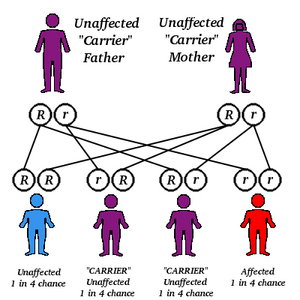Fanconi's anemia
Fanconi anemia (FA) is a rare genetic disease that affects children and adults from all ethnic backgrounds. Named for the Swiss pediatrician who originally described this disorder, Guido Fanconi, FA is characterized by short stature, skeletal anomalies, increased incidence of solid tumors and leukemias, bone marrow failure (aplastic anemia), and cellular sensitivity to DNA damaging agents such as mitomycin C. more...
Causes
FA is primarily a autosomal recessive genetic condition. There are at least 8 genes for which mutations in are known to cause FA: A, C, D1, D2, F, G, L, and B. FANCB is the one exception to FA being autosomal recessive, as this gene is on the X chromosome. For an autosomal recessive disorder, both parents must be carriers in order for a child to inherit the condition. If both parents are carriers, there is a 25% risk with each pregnancy for the mother to have an affected child. Approximately 1,000 persons worldwide presently suffer from the disease. The carrier frequency in the Ashkenazi Jewish population is about 1/90. Genetic counseling and genetic testing is recommended for families that may be carriers of Fanconi anemia.
Because of the failure of the components of the blood - white and red blood cells and platelets - the body cannot successfully combat infection, fatigue or spontaneous hemorrhage or bleeding. Bone marrow transplantation is the accepted treatment to repair the hematological problems associated with FA. Patients face an increased risk of acquiring cancer and other serious health problems throughout their lifetime.
Prognosis
Many patients eventually develop acute myelogenous leukemia (AML). Older patients are extremely likely to develop head and neck, esophageal, gastrointestinal, vulvar and anal cancers. Patients who have had a successful bone marrow transplant and, thus, are cured of the blood problem associated with FA still must have regular examinations to watch for signs of cancer. Many patients do not reach adulthood.
The overarching medical challenge that Fanconi patients face is a failure of their bone marrow to produce blood cells. In addition, Fanconi patients normally are born with a variety of birth defects. For instance, 90% of the Jewish children born with Fanconi's have no thumbs. A good number of Fanconi patients have kidney problems, trouble with their eyes, developmental retardation and other serious defects.
Read more at Wikipedia.org



